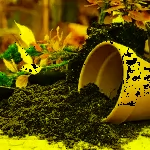
WPC, SPC, OR LTV are some acronyms for vinyl flooring with the first being the more durable and common flooring solution for small home renovations as well as for public spaces like stores, hotels, bars, etc.
Every type of vinyl flooring is made from PVC (polyvinyl chloride) and offers several advantages such as flexibility, easy cleaning, versatility in endless designs and color options, moisture resistance, aesthetically appealing, easy installation, and comfort while walking on.
WPC flooring and SPC are the most common types of vinyl flooring that are widely used these days. In this guide, we’ll only talk about WPC flooring and its general characteristics.
WPC Flooring—What Characteristics To Have In mind
- WPC flooring, which stands for wood plastic core/composite, is a hybrid flooring type that comprises a mix composition of high-quality plastic polymers and wood. This is why these floors have the qualities of both wood and plastic at the same time.
- WPC flooring has a composition of about 40% of high-density recycled plastic materials and 60% of cellulosic materials. And this is what determines the durability and quality of these floors.
- Another good characteristic of WPC flooring is its great resistance t moisture than traditional wooden floors.
- Unlike normal vinyl flooring, WPC flooring has a more rigid structure and which makes it harder, more stable, and resistant to extreme temperature fluctuations.
WPC flooring comprises four main layers:
- Lower Layer
It is responsible for providing firmness and stability to the floors.
- WPC Core
This extruded, water-resistant, high-density composite core distinguishes WPC flooring from SPC flooring. This core is totally stable and doesn’t expand or contract due to temperature fluctuations.
- The Middle Or Decorative Layer
This layer gives the floor a design with its realistic texture and finishes in imitation of other materials such as stone or wood.
- Protective Layer
This top layer of WPC flooring, which is also known as the wear layer, is extremely thick and protects the flooring from excess moisture, discoloration, and stains, extending its lifespan.
Advantages of WPC Flooring
- As WPC flooring is synthetic and waterproof in nature, it is ideal for areas with high temperatures and moisture content.
- The rigid construction and dimensional thickness of WPC flooring make it ideal for public areas such as shopping centers, schools, healthcare units, sports facilities, restaurants, etc.
- The installation of WPC flooring is very easy and doesn’t require trims or supports.
- WPC flooring significantly reduces the chances of slips and falls because of its water-resistance ability.
- Unlike other flooring materials, WPC floors have great sound-absorbing features.
- Manufacturing with low-emission and recycled products makes WPC flooring an environmentally friendly option.
- WPC flooring offers great resistance against scratches, stains, weights, and wear and tear from heavier traffic.
- These floors can support heavier pieces of furniture while maintaining their aesthetical appeal.
- As WPC flooring doesn’t replicate irregularities; it is not essential to level the subfloor before installing these floors.
So, this was a detailed guide about WPC flooring, its characteristics, and benefits. If you are looking for a quality floor for your home, look no further than WPC flooring!




